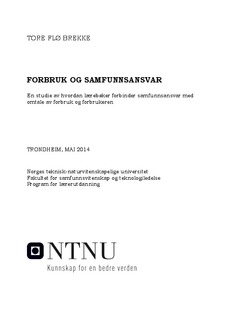| dc.contributor.author | Brekke, Tore Flø | |
| dc.date.accessioned | 2017-04-24T12:19:43Z | |
| dc.date.available | 2017-04-24T12:19:43Z | |
| dc.date.issued | 2014 | |
| dc.identifier.uri | http://hdl.handle.net/11250/2440538 | |
| dc.description.abstract | I denne masteroppgaven presenteres en kvalitativ forskningsundersøkelse av hvordan to ulike lærebokverk i samfunnsfag rettet mot ungdomsskolen framstiller det private forbrukets samfunnsansvarlige dimensjon. Oppgavens problemstilling er: Hvordan ivaretas samfunnsansvar gjennom lærebøkenes framstilling av privat forbruk og forbrukeren? For å komme fram til et svar på denne problemstillingen, har jeg utarbeidet tre forskningsspørsmål.
1.Beskriver lærebøkenes framstillinger forbruk som et isolert fenomen, eller som en arena for å utvise samfunnsansvar?
2.Hvordan beskrives forbrukeren i lærebøkene jamfør Aldridges typologi av forbrukere, og hvordan tillegges denne typen makt og ansvar gjennom forbruket?
3.Hvilket medborgerskapsideal ivaretas gjennom lærebøkenes framstillinger av forbruket og forbrukeren, og hvordan ivaretar denne framstillingen samfunnsansvar? Alle tre forskningsspørsmål har blitt besvart gjennomen kvalitativ innholdsanalyse av følgende lærebøker i samfunnskunnskap: Monitor 1, 2 og 3 og Kosmos 9. Til grunn for analysen har jeg valgt å redegjøre for teoretiske argumenter for og imot en sammenheng mellom forbruk og medborgerskap og samfunnsansvar, Alan Aldridges typologi av forbrukere i vestlig diskurs, samt to ulike tilnærminger til demokratiteori og medborgerskap, republikanisme og liberalisme. Resultatene fra analysen viser at Cappelen Damms lærebok, Monitor, knytter samfunnsansvar til fenomenet forbruk ved å bevisstgjøre leseren både miljømessige, sosiale og politiske konsekvenser av det moderne forbruksmønsteret. Teksten oppfordrer leseren til å reflektere over faktiske forbruksbehov, kunnskap om produksjonsforhold og egne verdier og informerer om folkelig engasjement og organisasjoner som arbeider med opplysning og politisk påvirkning. I tillegg oppfordres leseren til å bruke sin forbrukermakt til å påvirke produksjon og arbeidsvilkår. Monitor framstiller også en forbruker og medborger med makt til, og ansvar for, å forme det framtidige samfunnet. Kosmos opplyser om miljøkonsekvenser av forbruk og informerer om juridiske forbrukerrettigheter, men mangler en kobling til samfunnsansvar. Boken presenterer heller ikke noen oppfordringer til å bruke, eller eksemplifiserer bruk av, forbrukermakt til å påvirke samfunnet. Resultatet blir at Monitor ivaretar samfunnsansvar gjennom sine framstillinger av forbruk og forbruker i større grad enn Kosmos. | nb_NO |
| dc.description.abstract | This thesis will present a qualitative research study of how two different social studies textbooks, used in lower secondary school, depict the dimension of social responsibility through private consumption. The thesis aimsto answer the following problem: How is social responsibility maintained through textbooks’depiction of private consumption and the consumer? To address this problem, I have formulated three research questions:
1 .Do textbooks depict consumption as an isolated phenomenon, or as a venue to exercise social responsibility?
2.How do the textbooks describe the consumer, cf. Aldridge’s typology of consumers, and how is power and responsibility ascribedtothis typology?
3.What kind ofcitizenship ideal is maintained through the textbooks’depiction of consumption and the consumer, and how is social responsibility maintained through this depiction?
The research questions have been addressed through a qualitative content analysis of the following social studies textbooks: Monitor 1, 2 and 3 and Kosmos 9. As a basis for the analysis, I have chosen the following theoretical approaches: arguments for and against a connection between consumption and citizenship and social responsibility; Alan Aldridge ́s typology of consumers in western discourse; and two different approaches to democratic theory and citizenship theory, namely republicanism and liberalism. The results from the analysis show that Cappelen Damm ́s textbook, Monitor, connects social responsibility to consumption by raising awareness of both the environmental and social, as well as the political consequences of consumption, and by encouraging the reader to reflect on heractual needs and knowledge of manufacturing conditions along with her own values. Monitor informs the reader of the idea ofpublic involvement and of organizations working to promote public information and advocacy. In addition, this textbook encourages the reader to make use of her consumer power to influence manufacturing conditions. Monitor portrays a consumer and a citizen as a person with power, and thus responsibility,to help shape the future society. Fagbokforlaget ́s textbook, Kosmos,informs the reader of the environmental consequences of consumption, and of judicial consumer rights, but lacks a connection to social responsibility. Kosmos does not present any encouragement to use, neither exemplify the use of, consumer power to influence society. | nb_NO |
| dc.language.iso | nob | nb_NO |
| dc.publisher | NTNU | nb_NO |
| dc.title | Forbruk og samfunnsansvar - En studie av hvordan lærebøker forbinder samfunnsansvar med omtale av forbruk og forbrukeren | nb_NO |
| dc.type | Master thesis | nb_NO |
| dc.subject.nsi | VDP::Samfunnsvitenskap: 200::Pedagogiske fag: 280::Fagdidaktikk: 283 | nb_NO |
